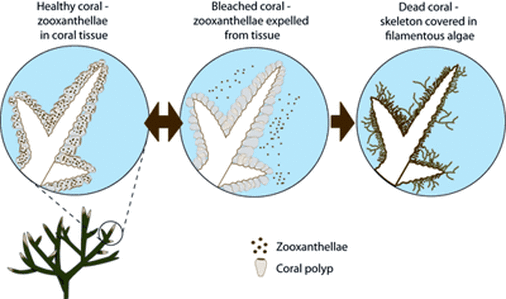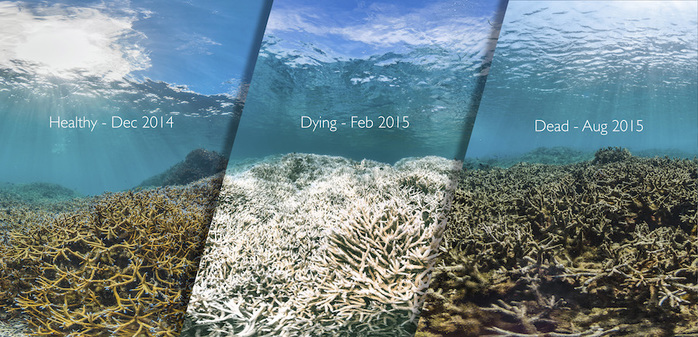|
Climate change has disturbed many living creatures throughout the world and coral reefs just happen to be included in that range. Warmer air has caused the ocean water temperature to rise, creating an unstable environment for the corals to live in. Corals are very sensitive to the water change and if the temperature stays above normal for a period of time, the corals begin to lose food that was stored in their tissues, this is called zooxanthellae. Zooxanthellae supply glucose, glycerol, and amino acids for the coral and are critical for maintaining a healthy state of living. Corals use glucose, glycerol, and amino acids for producing calcium carbonate, fats, carbohydrates and proteins, which are essential. The zooxanthellae contribute to the beautiful colors of the corals. Losing quantities of zooxanthellae will cause the coral to bleach, resulting in weakness and prone to diseases. When the coral has lost all zooxanthellae, it can no longer survive, resulting in death. Due to more carbon dioxide being released the ocean pH is becoming more acidic throughout the world. Since 1800, it is known that oceans have absorbed about 1/3 of the carbon dioxide from human activity and another 1/2 from the burning of fossil fuels. Corals cannot absorb calcium carbonate when the pH is lower than normal, causing their skeleton weaken and eventually dissolve right into the ocean salt water. Rising pH levels are not only going to affect coral reefs, but all organisms that live in the ocean. Organisms such as snails, clams, and urchins also make calcium carbonate so they will be affected. The ocean population will be more prone to disease because of the high acidity breaking down immunity. This can be a huge threat to both the organisms that live in and out of the oceans. Based on the image above, coral is being greatly affected quickly by the carbon dioxide levels in the atmosphere. Corals provide food and shelter for many organisms that live within them, and without the corals, many fish and sea creatures will be left without it. Although coral seems to not have a huge impact on our society, it really does when you learn what it provides and how it is used in an ecosystem.
References: Corals. (n.d.). Retrieved September 02, 2016, from http://oceanservice.noaa.gov/education/kits/corals/coral02_zooxanthellae.html Coral Reefs and Climate Change - How does climate change affect coral reefs - Teach Ocean Science. (n.d.). Retrieved September 02, 2016, from http://www.teachoceanscience.net/teaching_resources/education_modules/coral_reefs_and_climate_change/how_does_climate_change_affect_coral_reefs/
1 Comment
Josh G.
19/11/2016 11:48:39 am
How does the decline of coral reef affect the world since we are the one causing them to die?
Reply
Leave a Reply. |
Categories
All
Archives
March 2024
|


 RSS Feed
RSS Feed
